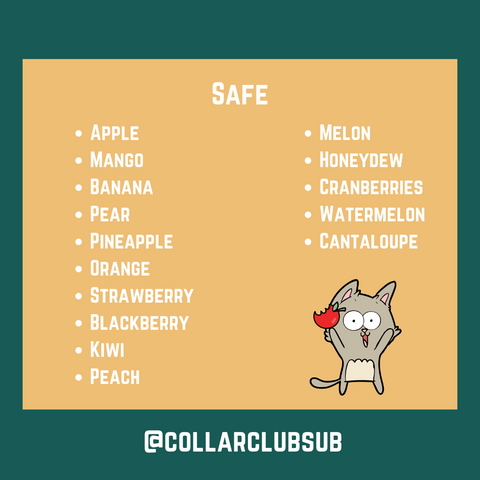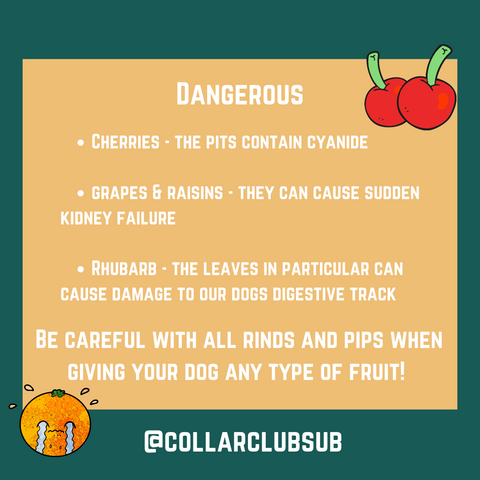As dog owners, we always strive to provide our furry companions with the best care possible. While a balanced diet is essential for their overall health, did you know that adding fruits to their meals can be a fantastic way to incorporate additional nutrients? Not only do fruits offer a burst of natural flavour, but they also provide numerous health benefits for our pooches. In this blog post, we will cover the advantages of feeding fruits to dogs, discuss which fruits are safe and beneficial, and caution against those that should be avoided. We will also provide a couple helpful links to some of our other informative blogs on keeping dogs cool in hot weather and delightful fruity treat recipes for your furry friend!
The Benefits of Fruit for Dogs
Feeding fruits to your dog can bring a multitude of benefits to their overall health.
- Fruits are rich in essential vitamins and minerals that support your dog's immune system, aid in digestion, and promote healthy skin and coat. Vitamin C, for example, helps boost their immune system, while vitamin A contributes to optimal vision and bone growth – all the better for seeing those squirrels across the park.
- Not only that, but they are packed with antioxidants that can help to prevent cell damage and reduce the risk of chronic diseases, such as cancer, heart disease, and cognitive decline.
- Many fruits have high water content, which can help keep your dog hydrated, especially during hot summer months. Adequate hydration is crucial for maintaining proper organ function and overall well-being.
- Fruits are an excellent source of dietary fibre, aiding in digestion and promoting regular bowel movements. fibre can also help manage weight by increasing feelings of fullness and reducing the risk of constipation.
- Finally, Certain fruits, strawberries, can naturally freshen your dog's breath. Strawberries contain an enzyme called Malic acid, which can help to break up plaque on dogs teeth. Coconut Oil is also great for fresh breath as its anti bacterial and anti fungal properties help to reduce bacteria in the mouth – think of It as a tasty dog friendly mouth wash!
The Good Fruits…
When it comes to choosing fruits for your furry friend, it's important to select those that are safe and beneficial for their health. Here are some fruits you can safely offer your dog:

Apples: Apples are a fantastic source of vitamins A and C, as well as dietary fibre. Make sure to remove the seeds and core before serving to avoid any choking hazards.
Blueberries: Packed with antioxidants, blueberries are a nutritious and tasty treat for dogs. They can support cognitive function and help reduce inflammation. Why not make some frozen treats with blueberries and yoghurt?
Watermelon: A refreshing fruit for hot summer days, watermelon is hydrating and contains vitamins A, B6, and C. Remember to remove the seeds and rind, as they can be difficult to digest.

Bananas: High in potassium and vitamins, bananas are gentle on your dog's stomach and make for a great training treat or addition to homemade treats.
And the Bad!

While many fruits are safe and beneficial, there are some you should avoid giving to your dog. These fruits at best, can cause digestive issues and at worst, can be toxic to your dog.
Grapes and Raisins: Grapes and raisins can lead to kidney failure in dogs, even in small amounts. For years it was unknown as to why grapes caused dogs such issues – but it is now believed to be due to the tartaric acid contained within them. There is no failsafe measure ment with grapes, as each type of grape contains different amounts of tartaric acid, which also fluctuates depending on their ripeness; It's best to just avoid them altogether.
Citrus Fruits: Citrus fruits, such as oranges, lemons, and grapefruits, contain citric acid, which can cause stomach upset and potential nervous system issues if ingested in large quantities. Generally the sourer the fruit, the more citric acid, and lots of it is held within the peel itself.
Avocados: Avocados contain a substance called persin, which can be toxic to dogs. Whilst your pooch isn’t likely to be sick if they steal some of your avocado toast (the flesh is low in persin) The skin and pit contain quite a bit. The pit can also present a choking hazard to your pooch so make sure to keep them off the counters if you have a surfer!
Incorporating fruits into your dog's diet can be a wonderful way to provide them with a range of health benefits. From essential nutrients and antioxidants to hydration and fresh breath, fruits offer a tasty and nutritious addition to their meals. Remember to choose safe and beneficial fruits, such as apples, blueberries, watermelon, and bananas, while avoiding toxic options like grapes, citrus fruits, and avocados.
For some delicious fruity treat recipes, visit our blog on fabulous frozen treats for dogs (link: https://www.collarclub.co.uk/blogs/collar-club-blog/5-fabulous-frozen-treat-recipes-for-dogs).
To further enhance your dog's well-being, check out our blog on keeping your dog cool in hot weather (link: https://www.collarclub.co.uk/blogs/collar-club-blog/pawtect-your-pack-this-summer-top-tips-for-keeping-your-dogs-cool-in-hot-weather).
